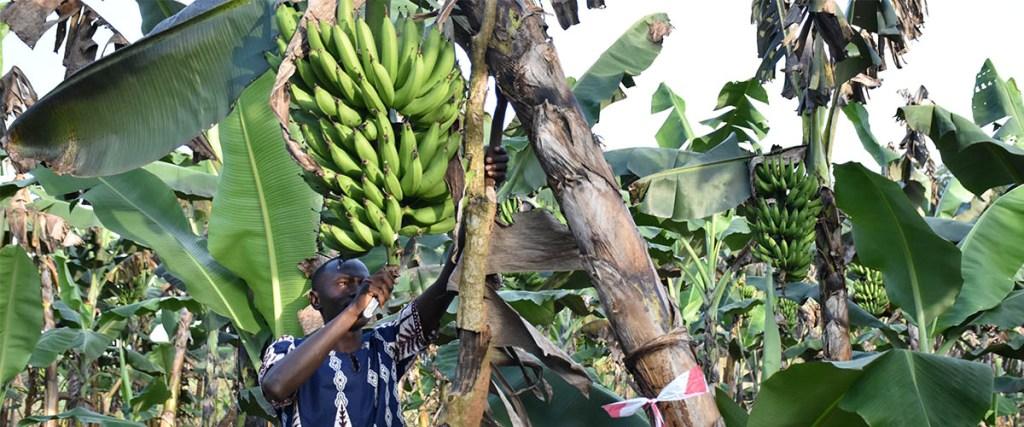(Kampala) – Ugandan banana farmers are adopting innovative insurance solutions to enhance their resilience against climate change. This initiative comes in response to the increasing frequency of extreme weather events that threaten their livelihoods.
Ahumwire Justine, a banana farmer from Shuku in southwestern Uganda, experienced firsthand the dangers of climate change when a rain and hailstorm last October destroyed 300 of her banana trees and resulted in the loss of two cows. This incident illustrates the significant challenges that farmers face as climate change leads to more unpredictable weather patterns. The Intergovernmental Panel on Climate Change has reported an increase in the frequency and severity of such storms, adding to the struggles of farmers in protecting their crops and livelihoods.
To address these challenges, the NDC Action Project—a partnership between the United Nations Environment Program (UNEP) and the UNEP Copenhagen Climate Centre—is working to improve the resilience of farmers like Justine. Mirey Atallah from UNEP emphasized the necessity of combining technical and financial resources to strengthen farmers’ defenses against extreme weather conditions.
Bananas are a crucial sector in Uganda’s economy, engaging 47% of farmers as of 2019. This crop is vital not just for nutrition but also for economic stability. However, the past 15 years have seen increasingly erratic weather patterns, causing uncertainty in this essential industry. The Banana Industrial Research and Development Centre, which represents 5,000 banana farmers, has played a key role in facilitating access to crop insurance, which is essential for mitigating the impacts of climate variability.
One of the most innovative aspects of this insurance program is the use of digital platforms for assessing damage, which simplifies the claims process and makes insurance more affordable and accessible for smallholder farmers. This initiative not only offers financial protection but also provides training in sustainable farming practices, which can significantly boost productivity and reduce vulnerability to climate change.
The expansion of this insurance project to include more farmers throughout Uganda marks a significant advancement in protecting the agricultural sector from the adverse effects of climate change. For farmers like Justine, this program offers not just compensation for losses but also the confidence to face future challenges.
In related commentary, Alhaj Kaddunabbi Ibrahim Lubega, Chief Executive Officer of the Insurance Regulatory Authority of Uganda, highlighted the importance of agricultural insurance in an agro-based economy. He noted that recent reports of losses in agriculture due to adverse weather are troubling, as they affect not only farmers but also the entire country through rising food prices.
Lubega emphasized that agricultural insurance serves as a crucial risk management tool, providing financial security against production losses. Given that many farmers rely on borrowed funds for agricultural inputs, insurance can help them recover financially after losses, allowing them to continue investing in their farms.
The Ugandan government has taken steps to support farmers through the Uganda Agriculture Insurance Scheme (UAIS), which provides subsidized insurance options. Managed by Agro Consortium, this program covers various agricultural risks, including crop and livestock losses. The government contributes Shs 5 billion annually to subsidize premiums, making insurance more affordable for farmers.
Since the introduction of the UAIS, the number of insured farmers has grown significantly, from 45,704 in December 2017 to 687,608 by March 2023. The claims paid out under this scheme have also increased dramatically, rising from Ugx 2.2 billion in 2017 to Ugx 33.4 billion by March 2023.
Farmers who embrace insurance have reported enhanced earnings and improved living standards compared to those without coverage. There is a growing demand for agricultural insurance, prompting discussions with the Ministry of Finance to increase subsidies to encourage further adoption.
The insurance industry is also focused on extending agricultural insurance services to farmers across the country, aiming to license 12,000 dedicated agricultural insurance agents. This initiative seeks to help farmers access credit from commercial banks, which have often deemed them too risky for lending.
Through these efforts, Ugandan banana farmers are better positioned to face the impacts of climate change, ensuring not only their own livelihoods but also contributing to the overall stability of the agricultural sector.




















